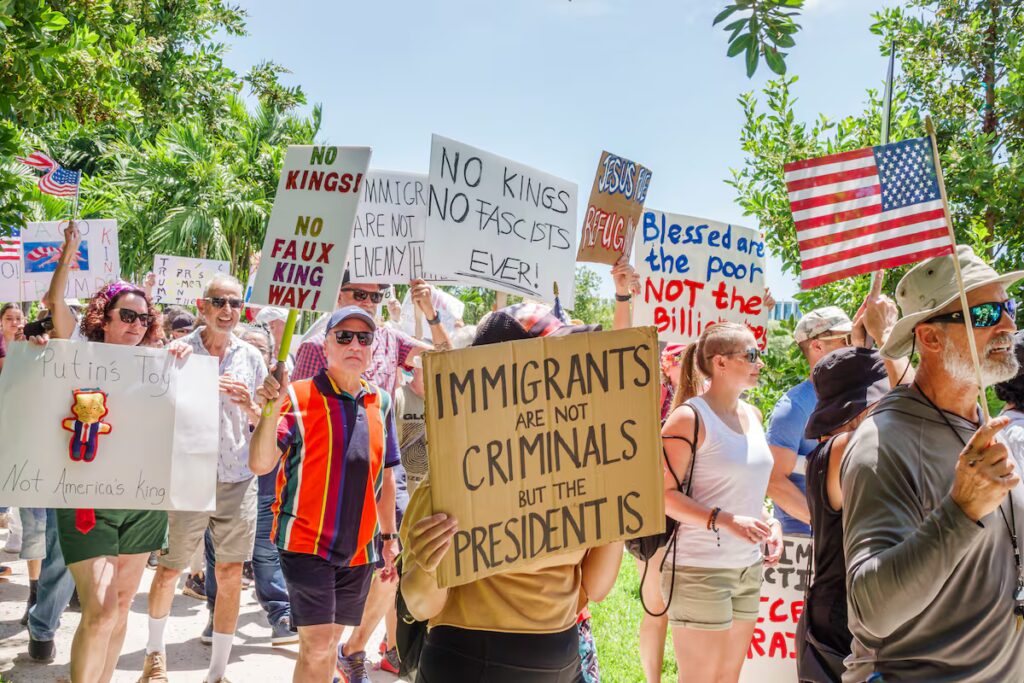
2025 will go down in history as one of the most difficult years for Latinos in the United States. Although nearly half (48%) voted for Donald Trump in 2024, his return to the White House did not mean what this community hoped for. This is confirmed by the Pew Research Center’s National Latino Survey, which offers one of the most accurate x-rays of the second largest racial or ethnic group in the country. Conducted in October 2025 among a representative sample of 4,923 adults, the study finds that four in five Latinos believe the president’s policies are harming them.
Latin Americans are increasingly critical of his handling of immigration issues and the management of the economy: 70% disapprove of the way the president carries out his office, 65% reject his administration’s approach to immigration issues and 61% say his economic policy is worsening their purchasing power and development opportunities.
As expected, these opinions are deeply divided between Democratic and Republican Latinos. Those who voted for the red party last year maintain strong support for the president and his policies, while his opponents express very negative views on the country’s current leadership. These patterns reflect the position of American society at large, the researchers say.

Pessimism takes over Latinos
According to the study, the systematic campaign of arrests and deportations, combined with the inflationary and employment effects of the president’s trade war, are causing Hispanics to doubt their future. This indicates that two-thirds (68%) believe their situation is worse today than it was a year ago. Only 9% say their lives have improved and 22% say their circumstances are pretty much the same. The researchers point out that this is the first time in two decades that a majority of Latinos say their living conditions have worsened. In 2021, only 26% were pessimistic about it.

When asked about the impact of government policies on them, the answer is devastating. 78% believe they are harmful, to the point that around a third of this population has thought about leaving the country in the last six months. Within this specific group, 33% say they are willing to move to their family’s country of origin and 45% to a third country. Among the reasons why they would emigrate, 46% underline the political situation that the United States is currently experiencing, while 26% would do so to live in a place with a more accessible cost of living.
Trump, disapproved by Latinos on economic issues
The majority of Latin Americans have a negative opinion of the economy and do not believe it will improve. 61% say Trump’s policies are hurting the country’s economic performance, 22% say his decisions have not had much effect and only 15% congratulate him on the direction public finances have taken. Looking ahead, the outlook for the Hispanic community is more negative than positive. About half (49%) believe things will get worse in 2026, while 28% are more optimistic and 23% believe the economy will stay the same.

The study indicates that the economic concerns of Latin Americans remain unchanged compared to last year. 35% are worried about the price of food and consumer goods and 30% about the cost of housing. Similarly, half (53%) also complain about the price of petrol and energy and the inability to find work.
1 in 5 Hispanics know someone who has been deported or detained
Complaints from Latinos about the Trump administration’s treatment of immigrants have been increasing since January. About 65% disapprove of Washington’s approach to immigration, including 48% who outright reject it. About one in five (21%) support his approach and 13% neither approve nor disapprove. When looking at this category by nationality, two-thirds of Central Americans and Mexicans criticize the president for his immigration offensive, as do 63% of South Americans, 58% of Puerto Ricans and 50% of Cubans.
Latinos originally from Central America and Mexico express fear that they or someone close to them could be deported. Half of Latinos with families originally from South America and Cuba feel the same way, and although all Puerto Ricans are U.S. citizens, one in three say they worry about deportations. The study reveals that one in five Hispanics personally knows someone who has recently been deported or detained.

The increase in raids and arrests of immigrants across the country – which no longer spare so-called “sensitive areas” and enable racial profiling – has led many Hispanics to reduce their participation in some activities. Such as attending community or local cultural events (10% say they do so less frequently than usual), speaking Spanish in public and attending gatherings organized by family or friends (9% less in both cases), going to the supermarket (8%) or visiting religious temples (7%).
Despite having largely negative views of the White House-ordered migrant hunt, nearly seven-in-ten Hispanics believe at least some of their undocumented peers should be deported. That includes 13% who say everyone should be deported and 55% who say some should be deported. Only 31% believe that no immigrants living in the United States should be deported.




